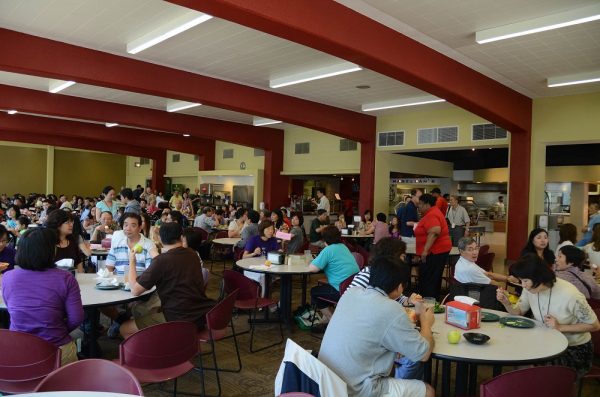Cafeterias: some people love them and some people love to hate them. Some students can’t imagine feeding themselves because Mom has always been there and they can’t imagine anyone cooking as well as she does. Whether you are looking to stay healthy or starting to feel homesick, hopefully, these tips can be helpful for you.
Running out of time…
You just had 3 classes, a meeting with a professor, a group project, and a trip to the bank. Time for cooking has quickly disappeared. Cafeterias prepare food for you, and this makes a big difference in a busy schedule! Most American cafeterias have different stations where you can get various types of food. A salad station with lettuce, raw vegetables, cooked eggs, and other toppings are commonly found. A grill station might have burgers, french fries, chicken or other ready made items. A station with rotating menu items that change every day and consist of vegetables and meats prepared in different ways. Many cafeterias also have a station where you can select raw ingredients and have a chef quickly cook your selection to pair with noodles or rice.
Worried about weight?
American universities work hard to provide fresh and healthy food options for the students who use their cafeterias. But even healthy food in excess can cause you to gain weight. American food contains a lot of preservatives like salt and sugar, so diet-conscious people should avoid too much processed food like hot dogs and desserts. Most universities have a nutritionist who is available to meet with students to give personal advice on how to eat healthy on campus.
Feeling homesick?
After a few months (or days) of eating American food, you may start to miss the flavors from home. Discover if there are ways to suggest recipes to your cafeteria. There might be an online form you could fill out, or a box somewhere for students to drop suggestions. Chefs usually enjoy hearing the opinions of international students and how they can better serve you. Don’t be afraid to meet with a chef and respectfully ask for some of your favorite dishes. If the staff is unable to change the menu, they may be willing to compromise by keeping a bottle of your favorite sauce with the other condiments. Some American food is halal, but talk to staff about what options are available for any restrictions you have.
Money Savvy
If you want to save money and enjoy cooking, purchase a reduced number of meals. This will mean more time preparing and buying food, so plan accordingly. Bigger cities have groceries which exclusively carry food from other countries, while smaller towns have American grocery stores that include a section with international food. Ask for directions or a ride from some of your American classmates, and maybe you will make a new friend. Bridges International can help you get to the grocery store and find transportation options so you can return on your own another day.
Making friends
Eating by yourself can feel intimidating. Most incoming university students share a similar experience of feeling like they don’t know anyone. Try asking someone who is eating alone if you can join them. If you have made a new friend, don’t forget to ask them for their phone number before you leave the cafeteria. A simple meal can be the beginning of a new friendship.
What tips have do you have for eating at your school?



